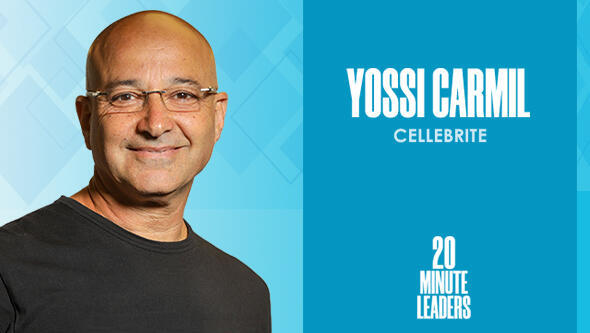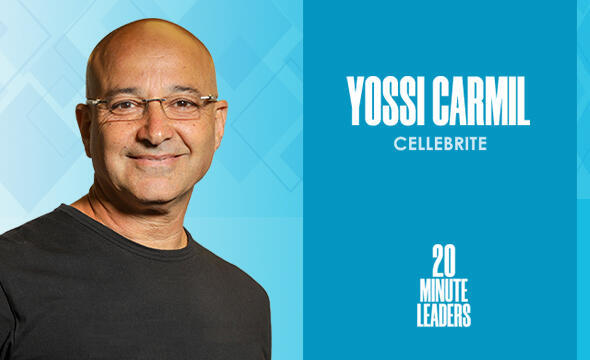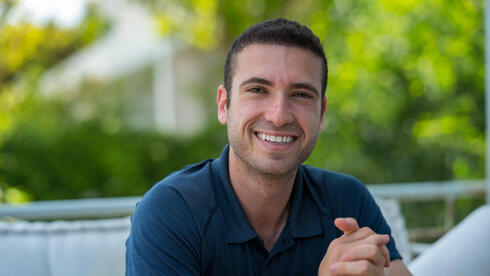
20-Minute Leaders
“The value you bring to police forces contributes to the personal security of each of us.”
Helping police and security forces is gratifying to Yossi Carmil, CEO of Cellebrite, because he gets to make an impact on people’s safety.
Helping police and security forces is gratifying to Yossi Carmil, CEO of Cellebrite, because he gets to make an impact on people’s safety. Cellebrite began by aiding police in finding evidence on mobile devices, and Carmil says they want to continue to expand and digitize the entire investigation process. He explains that the goal is to improve the abilities of the police through technology for increasingly digital investigations. But Cellebrite is going beyond the technology: they are creating a service academy to train police to stand behind the evidence in court. Carmil began his commercial career in Europe at a time when that wasn’t as common for Israelis. He shares that he was looking for an advantage, and his time in Germany allowed him to advance in companies with German and Israeli markets. Though his work is important, he says that his family is his foundation and helps keep him balanced.
Click Here For More 20MinuteLeaders
Today, you are the CEO of Cellebrite. Your journey spans beyond that and is definitely non-conventional. I want to start with you as an athlete.
I train between six to seven days a week. It's a mix of running, swimming, and yoga. But sport has been there since I was 14. It has to do with three things that are part of my personality: persistence, high discipline, and well-balanced. If you add the three together, I think I have a fascinating role as a CEO of Cellebrite.
But you need a balance. I've got two balances. I'm relying on my family: wife, and three kids. They are a very important base for everything. When I look at the balance that I need to bring into the mix as CEO of a publicly traded company, you need something that will balance you, so that's the role of sports.
Tell me about your personal transitions: economics, MBA, sales, leadership to CEO. What was that like?
I left the house when I was 18. I joined a paratrooper unit in the Israeli army as a combat, and after that, as an officer. Those were the steps where I gained real self-confidence. I started a journey of a life of challenges, growth within. I had the luck that qualitative leaders touched me along the road and gave me value and leadership growth.
After a few years in the Israeli Ministry of Defense, I moved to Europe and I lived for 10 years. I did my academy degrees, economy, and MBA, and worked in Germany for the first time in commercial life at Bosch and Siemens. That gave me an international and global perspective in my life. At the end of the day, I searched for a relative advantage. Back then, there were not so many Israelis who did the European arena as part of the professional buildup. Later on, I succeeded in two things: to do the Siemens role for a German company in Israel, and immediately after, I moved to an Israeli company who wanted to open the German market. I also did my first managerial roles as VP commercial of Siemens. After that, I managed sales teams.
Joining Cellebrite was something completely different. I joined, as employee number five, a small company that was amazing in terms of potential and growth. I joined as a VP Sales. I was nominated as the CEO 2005. In 2007, we were acquired by a Japanese public company. That was an amazing experience to do the journey as a small company growing side by side with a Japanese shareholdership with a major market in the USA.
Tell me a little bit about digital investigations and then the transformation.
As a company, Cellebrite is serving 7,000 customers as a B2B. About 5,000 are business-to-government, Homeland Security customers. 90% of those 5,000 are law enforcement agencies. Cellebrite is a professional vendor that really knows how to work with police.
I'm encouraged, motivated and fascinated by the work with police forces. The value you bring to them is something that contributes to the personal security of each one of us. Those forces are facing today a world of investigations that is becoming more and more digital. If we are looking at the challenges being solved by the Cellebrite portfolio, they are: first, digital evidence's quantity and complexity; second, the inefficient and silo mold of investigations; third, the need of the police to be ethical and accountable in the way they do investigations.
The first one, about the data quantity and complexity, is the fact that our police forces today are facing an explosion of data. They are overwhelmed by the quantity of digital sources: mobile, computer, drones, cloud, routers, CDRs, cars, videos, cryptocurrency. It's also the amount of data per device. Mobile is the main expertise of Cellebrite; think about the encrypted environment and the locked environment that they are dealing with.
The second part is the inefficiency and the silo mold. There’s lots of manual work, siloed work, disconnected between databases and storages. The police are suffering from a backlog in labs, in police stations, piling amount of mobiles, and you need something that will give an answer to that.
And the third, the amazing work of police faces the need in the digital era to give results fast. But on the other end, they need to pay attention to the chain of custody, the rights of the suspect, to touch only the relevant evidence. They need to be ethical in the way they do investigations, and they need to be accountable for the evidence. In order to make investigations smarter, faster, and more efficient and bring them as quickly as possible to the golden evidence, the answer to that is the portfolio of Cellebrite.
Tell me about the way that you are structuring these partnerships and how you integrate technology and Cellebrite mechanisms to existing mechanisms. How does this whole thing take place as a tech company?
I'm not sure I'll give you an answer, but it's a discussion actually. I am interested in technology. As a person, I'm much more interested in the ability of a technology to serve a mode of operation, and I'm fascinated by a business case.
I would rather take it to how a simple solution enables a simple load of operation. If I go back to Cellebrite, in 2008, we entered into that digital forensics line of business. We were not the first. We were a "me too" strategy. We brought a simple solution, which was designed to take data from a source phone to a target phone in point of sales of mobile operators. We brought that simple solution, simple to use, reaching technology into the police to enable them to meet the challenge of just taking evidence, hashed and protected from mobiles to bring in actionable evidence that they can stand behind.
Cellebrite was and is the world champion doing that in mobile. That was the start. In 2014, 2015, already, police in the US talked all over the place about the fact that they are Cellebrite-ing a device in the lab. We became sticky in the police lab as much as a refrigerator in your kitchen. But how? What makes us a successful "me too"? You basically penetrate. You look at your environment and then create a technological or other USP that creates a gap that the original entities in that field cannot close.
We were the first company to bring the ability to unlock or deal with deleted data and hidden data on mobile devices. But we also brought something very simple to use that could be used by a simple police officer. Later on, for those who would like to make a more deep dive with our tools in order to get deeper into a case, we brought an extension with investigative analytics, AI-based, machine learning-based, giving an answer to the need of connecting or surfacing data faster. Slowly but truly, we are adding an answer to the major pain, bringing the ability for the police to manage the investigations.
Although we are a software and a product company, we understood that we also need to enable the police to stand behind the evidence in court. We are building our service academy. It's not only about the technology but how we support the professional ability of our customers to stand behind the evidence in court.
Our plan is to update and upgrade the ability of police with technology, which then enables them to change the mode of operation. I would like to see five years from now that I'm bringing value to the police to digitize the investigative law end-to-end. "Who helps me to digitize it end-to-end?" They will say, "Cellebrite."
Michael Matias, Forbes 30 Under 30, is a Venture Fellow at Innovation Endeavors as well as investment Venture Partner at Secret Chord and J-Ventures. He studies Artificial Intelligence and Human-Computer Interaction at Stanford University, and was an engineer at Hippo Insurance. Matias previously served as an officer in the 8200 unit. 20MinuteLeaders is a tech entrepreneurship interview series featuring one-on-one interviews with fascinating founders, innovators and thought leaders sharing their journeys and experiences.
Contributing editors: Michael Matias, Megan Ryan

